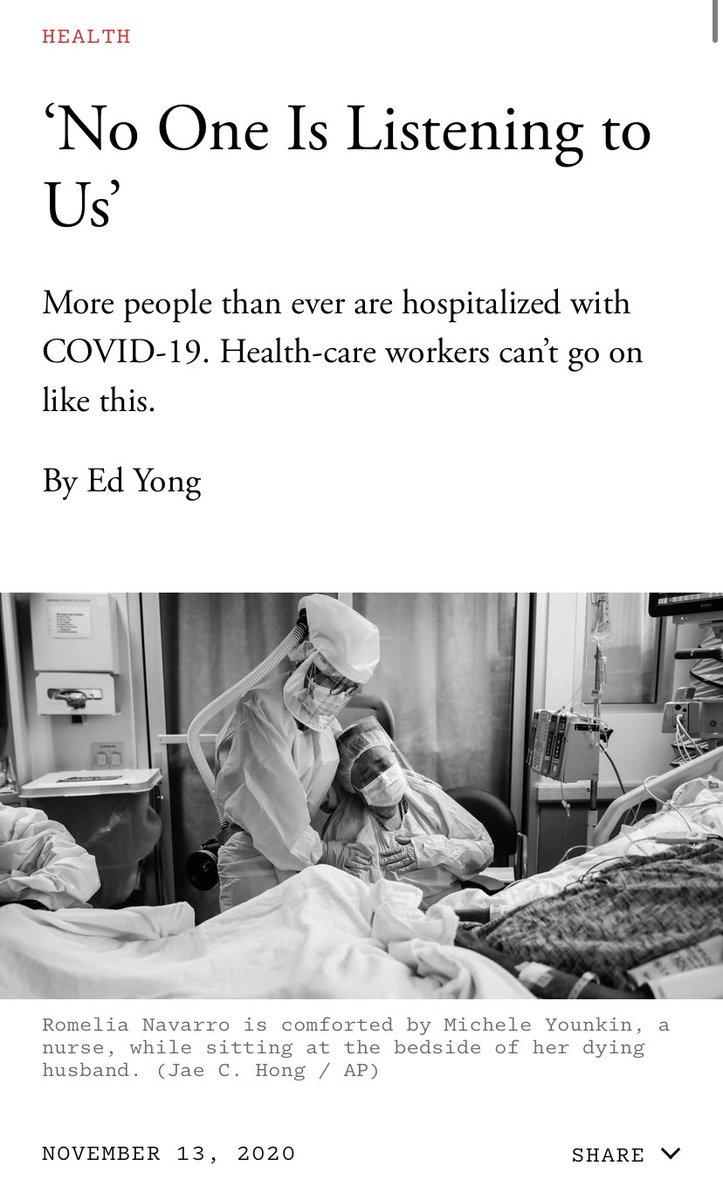
🚨During surges, much is written about healthcare workers burning out. But they often get by on adrenaline only to find, once ICUs are empty, that so are they.
In the US, 1/5 have left. More plan too. I wrote about the hemorrhage happening right now. 1/ theatlantic.com/health/archive…
In the US, 1/5 have left. More plan too. I wrote about the hemorrhage happening right now. 1/ theatlantic.com/health/archive…
I spoke to so many healthcare workers who’ve been broken by the pandemic—by the traumas they saw, the institutions that failed them, the moral distress of being unable to do their job. Many thought they were in medicine for life. They’ve quit, too. 2/
theatlantic.com/health/archive…
theatlantic.com/health/archive…
COVID is hard to treat. It quickly inundates hospitals.
Healthcare workers aren't quitting because they can’t handle their jobs. They’re quitting because they can’t handle *being unable to do their jobs*. 3/
theatlantic.com/health/archive…
Healthcare workers aren't quitting because they can’t handle their jobs. They’re quitting because they can’t handle *being unable to do their jobs*. 3/
theatlantic.com/health/archive…
COVID patients are getting more belligerent. A nurse said, “We’re at war with a virus & its hosts are at war with us.”
That’s eroding compassion, which is horrible. Being shaken by death comes with the job. Finding yourself *unmoved* is almost worse. 4/
theatlantic.com/health/archive…
That’s eroding compassion, which is horrible. Being shaken by death comes with the job. Finding yourself *unmoved* is almost worse. 4/
theatlantic.com/health/archive…
Many HCWs left more because of how their hospitals treated them than because of COVID itself. They were already burned out but "I was willing to stay & be miserable,” one said.
Then they realized that instead of being resigned, they could just resign. 5/ theatlantic.com/health/archive…
Then they realized that instead of being resigned, they could just resign. 5/ theatlantic.com/health/archive…
This creates a crushing downward spiral. People leave, things get harder for those left behind, *they* leave, and so on. 66% of acute/critical care nurses are thinking about leaving--not just their jobs, but *nursing*. 6/ theatlantic.com/health/archive…
Expertise is hemorrhaging. Many older nurses/docs have left, taking incalculable amounts of know-how with them. Already “things are being missed,” a nurse told me. “The care feels frantic and sloppy even though we’re not overrun with COVID right now.” 7/ theatlantic.com/health/archive…
Many HCWs told me they’re now more worried about their loved ones needing medical care *for anything*, never mind COVID.
This is the pandemic’s legacy. This is what 2 years of bad policy & individualistic choices have cost us. 8/
theatlantic.com/health/archive…
This is the pandemic’s legacy. This is what 2 years of bad policy & individualistic choices have cost us. 8/
theatlantic.com/health/archive…
This piece is not without hope. But I want to be real here. It's BAD.
I spent the last 2 weeks listening to dozens of people relive their worst 2 years. HCWs are used to bottling things up. When they talk—when they cry—we had better listen. Fin/
theatlantic.com/health/archive…
I spent the last 2 weeks listening to dozens of people relive their worst 2 years. HCWs are used to bottling things up. When they talk—when they cry—we had better listen. Fin/
theatlantic.com/health/archive…
These two pieces were written almost exactly a year apart.
A tragedy in two headlines. (Or a how-it-started/how it’s-going meme if you prefer)
13 Nov 2020 theatlantic.com/health/archive…
16 Nov 2021 theatlantic.com/health/archive…

A tragedy in two headlines. (Or a how-it-started/how it’s-going meme if you prefer)
13 Nov 2020 theatlantic.com/health/archive…
16 Nov 2021 theatlantic.com/health/archive…


• • •
Missing some Tweet in this thread? You can try to
force a refresh



